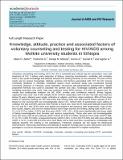| dc.contributor.author | Abdu O Abdu, G Teshome, Dereje M Melese, A Girma, K Daniel, A Agizie | |
| dc.date.accessioned | 2020-09-03T07:38:47Z | |
| dc.date.available | 2020-09-03T07:38:47Z | |
| dc.date.issued | 2017-05-30 | |
| dc.identifier.citation | 4 | en_US |
| dc.identifier.issn | 2141-2359 | |
| dc.identifier.uri | https://repository.maseno.ac.ke/handle/123456789/2678 | |
| dc.description.abstract | Voluntary counseling and testing (VCT) for HIV is essential and critical way for prevention, care and treatment of HIV. It allows early detection of illness, reducing transmission, morbidity and mortality from it. But youth knowledge and attitude towards HIV testing services is not universal. The aim of this study was to assess knowledge, attitude, practice and factors associated with VCT for HIV among University Students in Ethiopia. Institution based cross sectional study was conducted among University students in Ethiopia using pretested, structured self-administered questionnaire. Single proportion formula was used to calculate the sample size (361). Multistage sampling with stratified sampling technique was used. Data was analyzed using SPSS version 16.0 with chi square test, bi-variate and multivariate analysis via OR, AOR, p-value and confidence interval. Binary logistic regression was used. Out of 361 sample 93.6% of them responded, with 178 (52.7%) male and most are below 25 years. Majority were single, orthodox in religion, and from urban residence. 86% of them have heard of voluntary testing for HIV and know that having early test will prevent future spread of HIV. Based on the scoring 66% are knowledgeable about VCT. Almost 60% of participants were willing to undergo the test and 80% advices their friends to have test. Also 40.5% had good attitude toward test for HIV and 65.7 and 29.6% were ever tested and tested in the previous year respectively. Fear of HIV test results, stigma, and service related factors were major barriers for testing. Being male (AOR=1.607, CI: (1.01-2.57) p value= 0.047) and first year (AOR= 3.25, 1.33 – 8.83) were significantly had lower odds of being knowledgeable than females and seniors respectively. Those who were not knowledgeable have two times odd of poor attitude (AOR=1.901(1.20-3.02) P=0.006)). Students from urban (AOR=2.088, CI: (1.273- 3.425) P=0.004), unseparated family (AOR=2.24CI: (1.02-4.92) P=0.045) and with poor attitude (AOR= 1.76 CI: (1.08-2.89) p=0.024) were more likely not to have test than counterparts. Knowledge and attitude towards HIV testing is not satisfactory. Freshman students are the target for behavioral interventions. Improving awareness and attitude of students through peer to peer discussion and other packages is crucial to increase the practice and ultimately combat HIV in higher institutions. | en_US |
| dc.publisher | Academic Journals | en_US |
| dc.subject | Attitude, HIV/AIDS, Knowledge, University, voluntary counseling and testing (VCT), associated factors. | en_US |
| dc.title | Knowledge, attitude, practice and associated factors of voluntary counseling and testing for HIV/AIDS among Wolkite university students in Ethiopia | en_US |
| dc.type | Article | en_US |

